EFFECTS OF PARENTAL ROLES IN STUDENTS’ MATHEMATICAL LEARNING: HOW DOES THE EDUCATION LEVEL OF PARENTS EFFECT THEIR INVOLVEMENT?
Keywords:
parental involvement, parents’ roles, mathematics, learning, teaching, student motivationAbstract
The purpose of this is qualitative study was to explain the parents’ (specifically mothers’ in this study) own experiences with mathematics, and how these practices affected beliefs and motivation about mathematics, their roles in involvement of their children’s mathematics learning process. While explaining the phenomenon, the expectancy value and attribution theories were used. There were seven themes related to the obtained codes from the study. These were: Understanding of Mathematics, Importance of Mathematics, Knowing Mathematics, Nature of School practices, Mother Competency, Mother as Resource Provider, and Mother as Motivator. The study tried to explain whether their parental roles can be explained through the context of parental views of the importance of the subject and their involvement, through expectations for successful outcomes as a result of their involvement. Additionally, this study tried to investigate whether the education level of parents’ effect their parental involvement their children’s mathematical learning process.Downloads
Published
Issue
Section
License
Copyright (c) 2014 The Eurasia Proceedings of Educational and Social Sciences

This work is licensed under a Creative Commons Attribution-NonCommercial-ShareAlike 4.0 International License.
The articles may be used for research, teaching, and private study purposes. Any substantial or systematic reproduction, redistribution, reselling, loan, sub-licensing, systematic supply, or distribution in any form to anyone is expressly forbidden. Authors alone are responsible for the contents of their articles. The journal owns the copyright of the articles. The publisher shall not be liable for any loss, actions, claims, proceedings, demand, or costs or damages whatsoever or howsoever caused arising directly or indirectly in connection with or arising out of the use of the research material. All authors are requested to disclose any actual or potential conflict of interest including any financial, personal or other relationships with other people or organizations regarding the submitted work.




